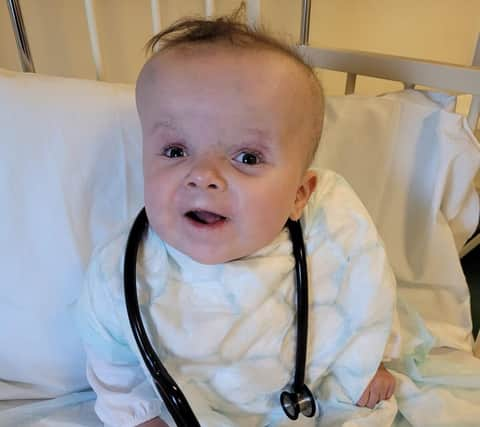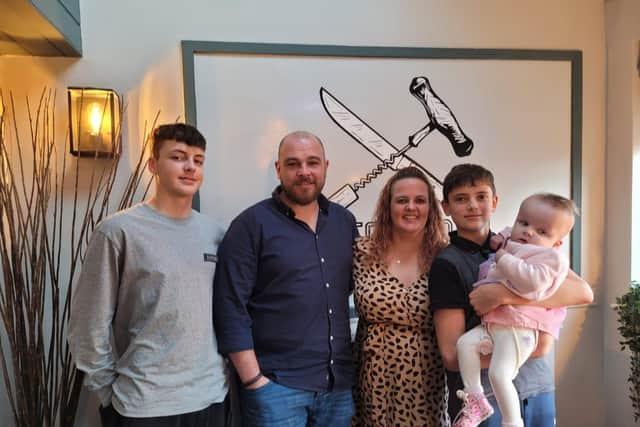Help needed for Olivia, 2, and her family ahead of risky stem-cell transplant


Little Olivia Volley, from Marshchapel, is nearly two-and-a-half years old and she was born at just 28 weeks gestation, and since then has spent much of her young life in and out of hospital, including the first 11 months of her life.
When she was born, she had struggled to thrive and wasn’t taking on the nutrients from her milk as she should, and she has undergone countless operations and procedures while doctors searched for answers.
Advertisement
Hide AdAdvertisement
Hide AdShe was finally diagnosed with Sideroblastic anemia with B-cell immunodeficiency, periodic fevers, and developmental delay (SIFD), an autosomal recessive syndromic disorder of which there are just 20 current cases worldwide.


Olivia is immuno-suppressed, which means her body does not create its own immune system, and she needs blood transfusions every three to four weeks as her bone marrow is not producing white and red blood cells properly.
“It’s been non-stop for the past two years,” said Jack, Olivia’s dad, “It’s been an incredibly worrying time and a strain on all of us, me and Sally, Olivia’s mum, have had to try to be strong for each other.”
It has now been decided by specialists that Olivia needs to have a stem cell transplant, beginning from April or May this year. The procedure has a 50/50 chance of being successful, and if it works, Olivia will be able to lead a normal life and go to school and other activities like swimming like other youngsters.
Advertisement
Hide AdAdvertisement
Hide AdBecause of the high risks to Olivia’s immune system, she will need to be in isolation at Newcastle Children’s Hospital for two months and have a course of chemotherapy to stop her immune system before the procedure.
After the transplant, she will need to be isolated again for another two months – a total of up to six months in hospital in Newcastle – but the risk to Olivia at recovery stage is very high, with just a 50 percent success rate.
Because of the risk and high dependency during the process, only one parent is able to be isolated with Olivia at a time, and one of either Jack or Sally will have to be with her all the time.
The treatment and recovery means that Olivia will need to be in Newcastle for up to 12 months, which will put a huge strain on the family as Sally also has older sons Harvey, 17 and Alfie, 16, Jack’s step-sons.
Advertisement
Hide AdAdvertisement
Hide AdJack said: “This is why we need to fundraise, because we will need to look for accommodation in Newcastle, and we've also got travel expenses to factor in, and specialist clothing for Olivia for before and after her surgery.”
Sally has had to give up work to be there for Olivia, and Jack has had to spend a lot of time away from his family through work in construction.
But despite all her health struggles, Jack said that Olivia is the happiest, smiliest little girl:
"She inspires me every day,” he said, “The amount of operations she’s had, and she’s had about 20 in two years, and every time she bounces back so quickly and takes it all in her stride – she keeps me going.
Advertisement
Hide AdAdvertisement
Hide Ad"I’ve really struggled at times, working away from home is so hard, but her positivity and happiness is so inspiring.”
To make a donation to Olivia and her family, visit the GoFundMe page at https://gofund.me/57dcabe3
How you can help people like Olivia
Stem cell donations are used to treat a wide range of blood cancers and disorders like Olivia's, and many donations come from close relatives such as a parent or sibling, as cells ideally need to be from someone with the same tissue type.
But between 65 to 75 percent of those in need are unable to find a sibling match, so rely on donations from strangers, and Olivia’s stem cells will be donated by an anonymous donor.
Advertisement
Hide AdAdvertisement
Hide AdIf you are aged between 16 to 30 [research finds that the younger the donor is, the higher chance of success], you could become a stem cell donor to save lives. You can join the stem cell register by visiting https://www.anthonynolan.org/help-save-a-life/
If you are found to be a match for a stem cell donation, your cells will be collected either through your bloodstream or from your bone marrow at one of Anthony Nolan’s collection centres at Oxford, Sheffield, Manchester or London.
Nine out of ten people donate through their bloodstream, which takes around four hours. One in ten people donate through their bone marrow in their hip under general anaesthetic.
More information on the stem cell donation process can can found at https://www.bbmr.co.uk/donating-stem-cells/